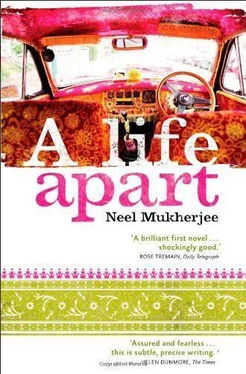What wakes him up is the cold: the boiler has run out of hot water in the time he has been sleeping under it. He rises, turns it off, shivering from somewhere deep inside him. He steps out, opens the door to his room and there it is, on the floor, as if it has been slid under the door — a white envelope, stark on the dun carpet. Wet and dripping, he picks it up and opens it. Inside, there is a single twenty-pound note. The man has left, god knows after waiting for how long. Ritwik wonders if he tried getting him out of the shower.
He fingers the crisp banknote and a whole new world starts to swim into view like an undiscovered planet caught in its orbit for the first time. So that is how much the man thought he was worth naked but unperforming. And his second thought is — ‘food money for nearly a week’.
He doesn’t know it now but he is going to look back on this as a watershed in his small life.
When Ritwik got a two-year scholarship to study in the UK, two months after his mother’s sudden death, he knew he was going to leave Calcutta for good. The scholarship was his escape route, the prison door that had been left miraculously ajar. He would walk out of that door and never return. When he flew out of Delhi — strangely enough, on the thirtieth of September, the first anniversary of his father’s death — he knew he wasn’t going abroad only to study but was also leaving behind one life, permanently, in exchange of another one; unknown, but better. This much he knew — it was going to be a better life, as what wouldn’t be, compared with what he had lived for seventeen years in Grange Road?
Ritwik couldn’t manage to explain the whole extent of it to Gavin that Sunday afternoon, first, in Queen’s Lane coffee house, and then, later, in Gavin’s room, when Gavin realized this wasn’t any ordinary casual-friendly visit Ritwik had asked for. But he tried. Haltingly first, sometimes embarrassed, at other times, down-right ashamed, and then in one scrambled shuffledance full of false moves and missteps, he attempted to give Gavin some idea of the terrain he had crossed. There was no order to it, no neatness or linearity, just a piecemeal tearing of the fabric and flinging the bits to Gavin. Let him try and make sense of it, Ritwik thought; where he had not managed well, perhaps someone else, an observer or an outsider, would do better.
At least he started from a kind of beginning: when Gavin asked him what exactly he was escaping from, he said poverty, but what he should have said was the possibility of never escaping.
‘I don’t want to live in squalor any more. I don’t want to go down the way of my father, helpless and exploited, unable to escape. I don’t want to become him. If I return there, they will now attach their suckers on to me. Life out there will just carry on running in the same groove, decade after decade. I want a different life,’ he said to Gavin. How could he explain that he was also trying to escape the wet sticky monsoons; the blood-drying heat of summer, which made him a drugged, ill, slow creature for six months of the year; the insects that came out in giant colonies and multiplied during the rains; the sheer filth and mud of Calcutta streets, which welled in over the edge of his frayed sandals and oozed between his toes; the thirteen hours of power cuts every day; the chronic water shortage; the smell of paraffin and kerosene oil everywhere; the soot on the glass of the hurricane lamps; the random days without meals, all fanning and exacerbating the tensions in the joint family, year after slowfestering year?
Gavin could very easily have replied, ‘Get a grip’ or ‘Welcome to Real Life’, or something equally cutting. And he would perhaps have been justified.
If Gavin was convinced, he didn’t show it. He had heard the disjointed, stuttering stories in total silence. For once, he had resisted making comments or ironical facial expressions.
‘Is it also. . also a. .,’ Gavin hesitated, ‘is it a matter of your sexuality as well that you don’t want to go back? I can’t imagine gays having a ball in India.’
Ritwik looked up. ‘Yes,’ he said, ‘yes, it’s partly that. I can be free here. No, you’re right, the opportunity to be myself here is something I value immensely.’
A long silence during which Ritwik fretted at the blatantly unconvincing segue into self-help-book talk.
‘Look, Gavin, one runs away from a country because of war, famine, torture, repressive regimes, all that sort of thing. Those are very serious things. But isn’t someone justified in turning one’s back on unhappiness, just turning away from the end of a road?
I’d like the opportunity to start again, in a new place, with new people. Is that so unthinkable?
‘Everyone aspires to a better life, why can’t I? I’ve got a chance now. . if only. . if only you’d show me an opening. . you’ve lived in this country for many years, you came here as a student but you worked and studied and managed to stay on. I’m just asking you to help me go down that way.’ He halted. There was a long pause. Then he said, ‘Besides, there’s nothing. . no one, actually, to go back to.’
The betrayal was ashy, bitter in his mouth as the image of his brother’s innocent face, brimming with the yearning to flee too, stabbed him. But he had to lie now, lie to live; besides, he could console himself with the last letter from Aritra, in which he had written of his imminent departure for Delhi to start his MA. He, too, would escape to his new life, Ritwik thought, trying to console himself, willing himself to believe that Aritra would be fine, would be able to look after himself. He had no choice except to believe in that. What Ritwik had purposefully hidden from Gavin was the sense of freedom into which his parents’ death had released him.
His parents had ensured that the brothers got a good education partly in the hope that when the boys grew up they would save their parents from the miserable lives in which they had got mired. Ritwik and Aritra were their one-way escape tickets, their pension fund, their rescue team. They had pinned all their hopes on the boys, counting out their days, waiting, waiting, waiting for the final move out of the hell of Grange Road.
But both boys had been released from that enormous burden of responsibility: from every day being weighed down by the expectation to perform, by the accumulated weight of the sacrifices their parents had made every day. Of course, these had never been made explicit but the silence of martyrdom, an eloquent dumb show of clenched jaws and haggard faces, had become deafening and solid.
The boys had been brought up like pack horses, blinkered to see nothing else but the path straight ahead; suddenly their masters and drivers were gone. The slow grind of the knowledge that they were investments or life-insurance policies disappeared one day, burnt by the same flames that consumed their mother. In its place was a freedom so vast and so dark it was as if they had been catapulted into deep space. No one to look after in their old age, no responsibilities, no waking up in the middle of the night worrying about the ill health of frail parents or the money to pay for their proliferating illnesses, no rope at their neck; their lives were their own at last, no one could lay any claim on them.
When Ritwik had returned from his scholarship interview and told Aritra the good news, his brother’s face had first fallen and then radiated the purest joy, the joy of watching your prison inmate escape, knowing you’re going to be next through the breach he has made. As children, both of them had been reminded constantly by their mother, ‘Doing well in school is the key to everything. You can have everything you want if you’re good in studies.’ The indoctrination had worked in ways that even she hadn’t dreamed of. Both boys had found it easy to do well academically but Ritwik was not so sure if this had come about because it was the only reward he could have given his miserable parents — their eyes lit up when the school report came in or when one of the boys won a prize; they couldn’t stop beaming and stopping the neighbours in the streets to tell them about their latest achievement — or if he had been beaten into doing well by his mother. Either way, the key, which she had so incessantly talked about, was miraculously in his possession and he hadn’t even known he had had it until he was awarded a scholarship to go and study in England.
Читать дальше












